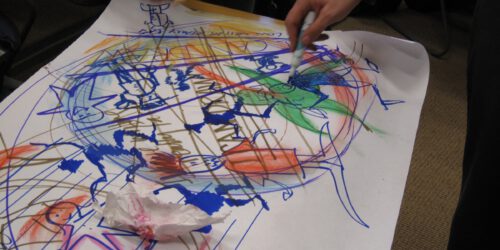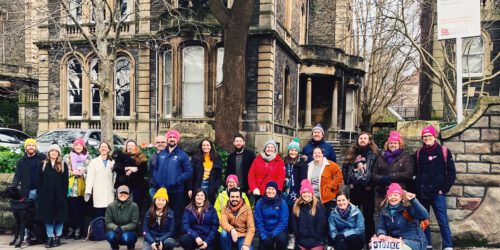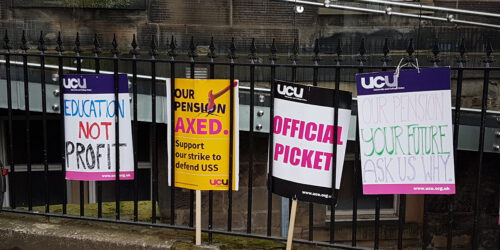On Sustainability and Solidarity

This post by Shelby Brewster is part of a series on Sustainable Academia—in cooperation with the Next Generation Action Team (NEXTGATe) of the European Society for Environmental History—in which contributors reflect on the conditions of historians in Europe and beyond (especially those in early career stages), introduce visions for the field, and suggest concrete action in order to build more inclusive and supportive academic environments.
As Time Magazine wrote late last year, labor unions are having a moment. Precarious conditions that have long been the norm have become both more prominent and more severe. Workers in diverse industries across the world are collectively organizing to advocate for themselves and their colleagues. The first REI just unionized. More than 100 Starbucks stores have filed for union recognition. The 2020 farmers’ protest in India was accompanied by a nationwide general strike.
Higher ed has been no exception, seeing labor action from tenured faculty to student staff. At my doctoral institution, the University of Pittsburgh, from which I graduated in 2021, faculty won their union election last year, a staff campaign is gathering momentum, and the graduate worker effort is mired in a complicated legal battle with administration.
How can scholars join this moment to actualize change in the academia toward a more sustainable future?
In this post, I propose some of the ways various communities in academia across fields need to organize. I’m speaking as both a member of academia and a former organizer who spent five years working towards unionization in the face of an administration that actively worked against us.
First, a brief preface. This is not a comfortable conversation. This is the first thing I learned as an organizer. It is hard. It is difficult. It involves reexamining yourself and going outside your comfort zone on a regular basis. On the individual level, this means different things for different people. For me, it meant not just overcoming my social anxiety, but also the prevailing attitudes that STEM fields are inherently different (some would say better) from the humanities and that, therefore, the two cannot organize together. For those who have tenure or other forms of security, this means stepping up for those more precarious in your department, whether they be staff, contingent faculty, graduate students, or student workers. Not just noticing and acknowledging that precarity, but actively using the affordances of your position to fight for your precarious colleagues. On the collective level, it means recognizing that other members of the university and wider community connected to it are even MORE precarious, and this is vital to remember. These issues are not going away, and precarity hurts all of us.
Here I present five broad points necessary to foster solidarity in academia in service of a more sustainable and equitable profession.
1. Academic work—even in the humanities—is work. In 1997, Stanley Aronowitz called the professoriate “the last good job in America.” We can certainly debate what precisely “good” means in this context. We can talk about the differences in higher education in other national contexts. We can analyze the data showing how the number of these jobs has plummeted since then. But what I find most interesting about Aronowitz’s phrase is the JOB part. Academic work is a JOB. To survive as a field, in my opinion, it’s essential for scholars to recognize this fact. This does not mean that we aren’t passionate about our research or devoted to our teaching or committed to our artistic practice. The JOB is about reconceptualizing your relationship not to the field or to the students, but to the institution, because…
2. As Sarah Jaffe says, “work won’t love you back.” Too often, those at the helm of academic institutions have taken advantage of the positive feelings that people have about their work to justify poor pay, dismal benefits, and lackluster support. It’s not sufficient to just “do it because we love it”—although of course most do. Scholars have to realize that universities are institutions, ones that look more and more like corporations every year. To ensure the future of history as a discipline (and I’d argue the liberal arts broadly, and perhaps academia as a whole), scholars need to reject the rhetoric of the university as a family and recognize that the institution can and will do everything in its power to turn a profit (if nothing else, COVID has shown that).
3. As Fred Moten and Stefano Harney argue in their concept of the university as undercommons, “In the face of these conditions one can only sneak into the university and steal what one can.” Moten and Harney’s work deserves much more engagement than I can offer here. I take this phrase to emphasize that institutions can and will steal from us—think of the institutionalization of DEI work that demands more labor from marginalized scholars or the defanging and dilution of political commitments of those who become administrators. Therefore the only option is to sneak in and steal what we can, while remembering that both the university is also, importantly, a community.
4. These communities are not in isolation, but in relation to the cities and communities of which they are a part. And, as Davarian Baldwin recently wrote, “universities are plundering our cities.” Any organizing effort must recognize that the most precarious workers are those in dining halls, delivery vans, and utility closets. True solidarity must connect the struggles of other workers within the academy, and any organizing effort must also be committed to anti-racism.
5. Because, in the words of Robin D.G. Kelley, “the university is not an engine of social transformation. Activism is.” Collective organizing is a form of activism that, when connected to and united with other struggles, can manifest social transformation in ways the university as it currently exists cannot and will never do.
Solidarity is key to any effort of collective organizing. To again draw from Kelley at a recent talk, “Solidarity is not something that comes out of starvation. It comes out of will.” Scholars need the will to collectively organize not only in spite of, but because of institutional obstacles to solidarity within the university.





